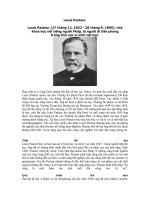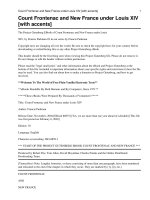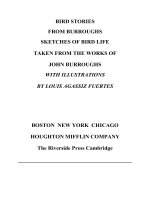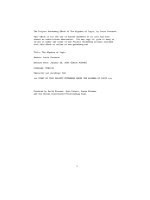louis armstrong
Bạn đang xem bản rút gọn của tài liệu. Xem và tải ngay bản đầy đủ của tài liệu tại đây (33.73 KB, 2 trang )
Louis Armstrong Tarenah HenriquesDec. 10, 1998 Period 4
"Louis Armstrong" Born in August 1901 (not Independence Day
1900, as he was always told and believed), Louis Armstrong sang on the
New Orleans streets in a boyhood quartet and in 1913 was admitted to
the Colored Waifs' home for firing a gun into the air. In the home he
learned the trumpet, and within four years was challenging every trumpet
king in his home town, from Freddie Keppard to Joe Oliver, his first
father-figure, whom he replaced in Kid Ory's band in 1919. In 1922 Oliver
(by now King Oliver) invited Louis to join him in Chicago to play second
trumpet. Tempting as it is to echo Nat Gonella's incredulous comment, "I
can't imagine Louis playing second trumpet to anyone", Oliver was able to
teach Armstrong a little. The regular harmonic experience of playing
second (his ear, even then, was faultless) and, above all, the importance
of playing straight lead in "whole notes", as Oliver did, were lessons that
Armstrong was to remember for life. Experience was by now,
however imperceptibly, toughening the young man up. His second wife Lil
Hardin helped to focus his streak of ambition and he was learning that
people could be devious - Oliver, it transpired, was creaming his
sidemen's wages. Although he loved Oliver until the end, by 1924
Armstrong had made the jump to New York and Fletcher Henderson's
orchestra. It was hot city company for a country boy, but he had the
humor and talent to counter mockery ("I thought that meant 'pound
plenty'!", he quipped, when the stern Henderson ticked him off for a
missed "pp" dynamic); somewhere along the way he decided he was the
best, and got ready to defend his title if necessary. "Louis played the
Regal Theater in Chicago," remembers Danny Barker, "and they had this
fantastic trumpeter Reuben Reeves in the pit. So in the overture they put
Reuben Reeves on stage doing some of Louis's tunes. Louis listened -
then when he came on he said, "Tiger Rag". Played about thirty
choruses! The next show? No overture!" In 1925 Armstrong, already
a recording star, began OKEH dates with his Hot Five and Seven
(featuring Johnny Dodds, Kid Ory and his wife Lil, until Earl Hines
replaced her). The music on masterpieces such as "Cornet Chop Suey",
"Potato Head Blues", "Sol Blues" and "West End Blues" turned jazz into a
soloist's art form and set new standards for trumpeters world-wide. At the
peak of his young form, Armstrong peeled off top Cs as easily as
breathing (previously they were rare) and pulled out technical tours de
force which never degenerated into notes for their own sake. His singing
introduced individuality to popular vocals and, just for good measure, he
also invented scat singing, when he dropped the music one day at a
recording session. Best of all was his melodic inspiration: his creations
were still being analyzed, harmonized and celebrated half a century later.
Rather than playing ever higher and harder, Armstrong simplified his
music, polishing each phrase to perfection, while keeping his strength for
the knockout punch. By 1930 he was a New York star, with imitators
all around him, but his business life was at a temporary impasse. Then he
found his Godfather-figure, a powerful, often ruthless Mafia operator
called Joe Glaser, who was to steer his client's fortunes for 35 years. In
1935, with Glaser's approval, Louis teamed with Luis Russell's orchestra,
an aggregation of old New Orleans friends, and for five years he was to
tour and record with them: the records are classics, and helped to get
Armstrong into films such as Pennies from Heaven (1936) and Artists and
Models (1937). In 1940, Glaser's office brusquely sacked the band
and Louis put together another containing younger "modernists" such as
John Brown (alto), Dexter Gordon (tenor) and Arvell Shaw (bass), a long
Louis associate, with Velma Middleton sharing the singing. It lasted until
summer 1947, but big bands were on a downward slide and Armstrong
found leading a headache. In 1947 promoter Ernie Anderson
presented him with a small band (directed by Bobby Hackett) at New
York's Town Hall. The acclaim that greeted the move signaled the end of
his big-band career, and for the last 24 years of his life, Louis led his All
Stars, a six-piece band which featured, to begin with, a heady mixture of
real stars ("too many make bad friends", said Armstrong ruefully later),
including Jack Teagarden and Earl Hines. It developed into a more
controllable and supportive team featuring, at various times, Barney
Bigard and Ed Hall (clarinet) and, a strong right arm, Trummy Young
(trombone). With his All Stars, Armstrong presented a tightly arranged
show which, right down to repertoire and solos, seldom varied in later
years, a policy which was sometimes criticized. But great records made
with the All Stars, such as Plays W. C. Handy, Plays Fats and At the
Crescendo, became jazz anthems, and solos such as Louis and the
Good Book and its superior follow-up Louis and the Angels revealed
Armstrong at a wonderful late peak. At his own wish the All Stars
maintained a crippling touring schedule and in 1959 he had his first heart
attack. For his last ten years, amid hit-parade successes, unabated
touring and recurring illness, Armstrong gradually slowed down: by 1969,
when he visited Britain for the last time, it was noticeable that though his
playing was rationed (though still painfully beautiful) and that he was
looking older. He died in bed (smiling) on 6 July 1971; his records have all
remained in catalogue ever since and in l994 a late Armstrong single,
"We Have All The Time In The World" rose high in the pop charts. It's
impossible to discuss "Satchmo" without remembering the man: "He was
a very joyous host," says Ruby Braff, "even in his dressing room with fifty
people standing round." It is time to kill off the legend that Armstrong's
big-heartedness was a pose: says Barney Bigard, "There never was any
hidden side to him. He came 'as is'." Another legend deserves demolition:
that Louis was simply the lucky one of countless talents in and around
New Orleans (Jabbo Smith and Punch Miller are two cited contenders):
the records prove otherwise. More recently it's been suggested that
recurrent lip trouble (which Armstrong certainly suffered) caused a
musical decline from the 1930s on: again, his performances demonstrate
a continuing achievement. "He left an undying testimony to the
human condition in the America of his time": Wynton Marsalis's way of
saying, in 1985, that Louis was simply the greatest jazz trumpeter ever
and, with Charlie Parker and Duke Ellington, the most influential jazzman
of the classic era.Bibliography Bergreen, Laurence. Louis Armstrong: An
Extravagant Life. New York : Broadway Books, 1998.Louis Armstrong
*censored* />ored* Satchmo *censored**censored*Woog,
Adam. Louis Armstrong. Detroit : Lucent Books, 1995Word Count: 1151









